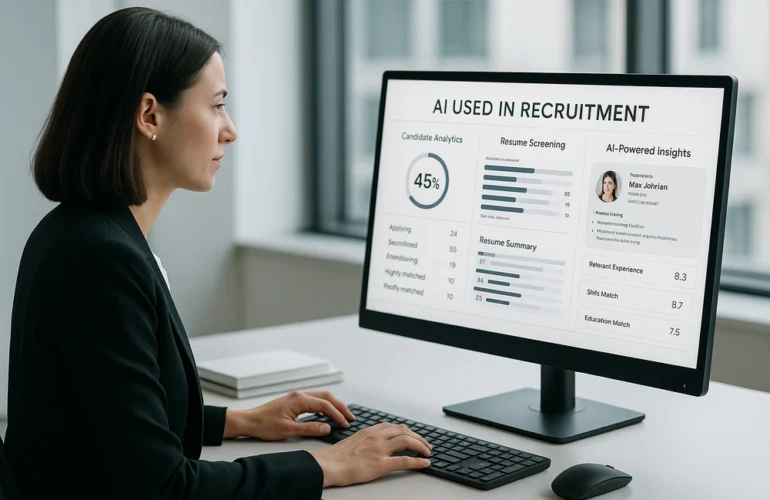MOI Qatar Visa Check Online 2026 | Complete Guide
Your Qatar visa check online 2026 in Minutes. Checking your Qatar visa status has never been easier. The Ministry of Interior (MOI) Qatar provides a free online portal where you can verify your visa status, download approved visas, and track application progress. Whether you’re applying for a work visa, a visit visa, or checking your residency permit status, the MOI Qatar visa check system gives instant results 24/7.
How to Do MOI Qatar Visa Check Online
The official MoI Qatar visa check portal allows anyone to verify visa status using basic passport information. Here’s the complete process:
Step-by-Step Qatar Visa Check Instructions
- Access the Official Portal—Visit the Ministry of Interior Qatar’s official website at www.moi.gov.qa
- Navigate to Visa Services—Select “Visa Inquiry” or “Visa Services” from the main menu
- Enter Required Details – Input your passport number exactly as shown on your passport
- Select Nationality—Choose your country from the dropdown menu
- Complete Verification – Fill in the captcha code to confirm you’re not a robot
- View Results—Click “Search” to instantly see your qatar visa status
The system displays real-time information directly from MOI’s immigration database, showing your current visa status, validity dates, and sponsor details.
Understanding Qatar Visa Status Types
When you perform a qatar visa check online, the system will show one of these status indicators:
Approved (Issued) – Your visa application has been accepted and is ready for printing. You can download the visa and proceed with travel arrangements.
Under Process—MOI officials are currently reviewing your application. Processing times vary from 1 to 7 business days, depending on visa type.
Rejected – The application was denied. Contact your sponsor to understand the specific rejection reason and explore reapplication options.
Expired – The visa validity period has passed. You’ll need to apply for a new visa to enter Qatar.
Cancelled – The visa has been terminated by the sponsor or immigration authorities. This typically happens when employment ends or sponsorship changes.
MOI Qatar Visa Inquiry & Printing Process
Qatar visa check online After checking your visa status, which shows “Approved”, you can immediately download and print your visa:
- Click the “Print Visa” or “Download” button on the results page
- Save the PDF document to your device
- Print multiple copies for immigration purposes
- Keep digital backup copies in email and cloud storage
- Verify all personal details match your passport exactly
Your printed moi visa document must be presented at Hamad International Airport immigration along with your passport upon arrival in Qatar.
Using Metrash2 App for Qatar Visa Check
Qatar’s government launched Metrash2, a comprehensive mobile application that includes qatar visa inquiry services:
Mobile Features:
- Check visa status from your smartphone
- Receive push notifications when visa status changes
- Access other MOI services (traffic fines, vehicle registration)
- Arabic and English language options
- Biometric login for faster access
Download Metrash2 from the App Store or Google Play. The metrash2 visa check function works identically to the web portal but offers convenience for on-the-go status tracking.
Common Issues When Checking Qatar Visa Online
Qatar visa check online: “Passport Number Not “Found”—Verify you’re entering the passport number with correct formatting. Some passports include letters before numbers. Remove spaces and special characters.
Database Shows Old Visa Information—MOI systems update every 24-48 hours. If you recently submitted a new application, wait one business day before checking again.
Website Loading Errors—The MOI portal experiences high traffic during Qatar business hours (7 AM – 2 PM Doha time). Try accessing during off-peak hours or use the Metrash2 app instead.
Different Status on Multiple Checks—If a Qatar work visa check shows conflicting information, contact your employer’s PRO (Public Relations Officer), who handles visa processing.
Qatar Work Visa Status for Job Seekers
Most expatriates checking Qatar visa status are employment visa holders. The process works differently for work visas:
- Employer Initiates – Your Qatar-based company applies for your work visa through their PRO
- Medical Clearance – Some positions require pre-approval medical certificates
- Security Clearance—MOI conducts background verification (1-5 days)
- Visa Issuance—Approved visas are valid for 3 months from issue date
- Entry to Qatar—Use visa to enter Qatar, then complete medical test and fingerprinting for residence permit
Currently searching for Qatar employment? MahadJobs.com connects qualified professionals with employers across Qatar, offering visa sponsorship. Browse current opportunities in construction, engineering, hospitality, healthcare, IT, finance, and more.
Different Types of Qatar Visas You Can Check
The visa check qatar system covers all visa categories issued by MOI:
Employment Visa – Sponsored by Qatar-registered companies for expatriate workers. Valid for initial entry, converted to a residence permit after arrival.
Visit Visa (Tourist)—Short-term entry permit for tourism, typically 30 days. Available as a visa on arrival for 89 nationalities.
Family Residence Visa—For dependents (spouse, children) of Qatar residents meeting minimum salary requirements.
Business Visa – For attending conferences, meetings, or short-term business activities in Qatar.
Transit Visa – For passengers with layovers at Hamad International Airport needing to leave the airport.
Student Visa – For international students enrolled in Qatar universities and educational institutions.
Qatar Visa Check Processing Times
Standard processing times for moi qatar visa status updates:
- Visit Visa: 1-3 business days
- Work Visa: 3-7 business days
- Family Visa: 5-10 business days
- Business Visa: 2-4 business days
Processing times increase during peak seasons (September-November for work visas, summer months for tourist visas). Submit applications well ahead of planned travel dates.
Authority Resources for Qatar Immigration
For official information and services, visit these government resources:
- Ministry of Interior Qatar—www.moi.gov.qa—Official visa services and inquiry portal
- Qatar Immigration Department—Handles all visa issuance, renewals, and status updates
- Hukoomi Qatar eGovernment – portal. www.gov.qa – Centralised government services platform
Always use official government websites for visa checking and applications. Avoid third-party services claiming to “expedite” visa processing, as these are typically scams targeting expatriate workers.
Frequently Asked Questions About Qatar Visa Check
How long does Qatar visa processing take?
Employment visas typically process within 3-7 business days after submission. Visit visas are usually approved within 1-3 days. Family residence visas take 5-10 business days due to additional documentation requirements.
Is the MOI Qatar visa check service free?
Yes, checking your visa status through the official MOI portal or Metrash2 app is completely free. Never pay third parties for basic visa status inquiry services.
Can I check another person’s Qatar visa status?
You can check anyone’s visa status if you have their passport number and nationality information. However, visa documents contain personal information, so only check with the person’s knowledge and permission.
What should I do if my Qatar visa is rejected?
Contact your sponsor (employer or family member in Qatar) immediately to understand the specific rejection reason. Common issues include incomplete documentation, security concerns, or sponsor company problems. Many rejections can be resolved and resubmitted.
How do I extend my Qatar visa?
Visit visas can be extended once for an additional 30 days through the MOI offices or authorized travel agencies. Work visas automatically convert to residence permits, which are renewed annually by employers.
Ready to Work in Qatar?
While checking your current visa status, start exploring employment opportunities across the Gulf region. MahadJobs.com specializes in connecting international job seekers with verified employers in Qatar, the UAE, Saudi Arabia, Kuwait, Bahrain, and Oman.
Why Choose MahadJobs.com:
- Direct connections with employers offering visa sponsorship
- AI-powered matching between your skills and available positions
- Free CV analysis and optimisation tools
- 24/7 job search support
- Specialised focus on Gulf region employment
Create your free profile today and let Gulf employers find you. Upload your CV to receive instant matches with positions aligned to your experience and qualifications.

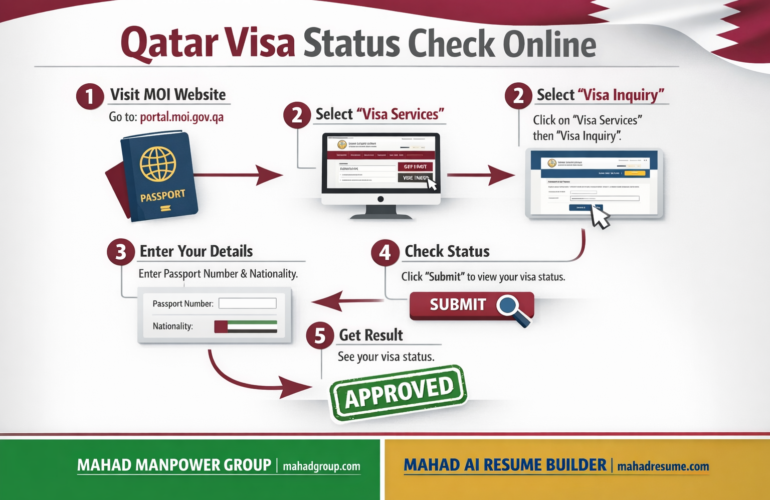


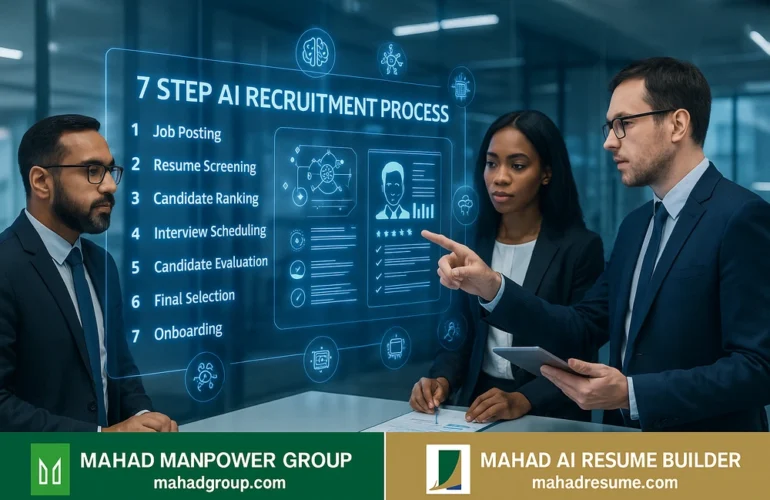
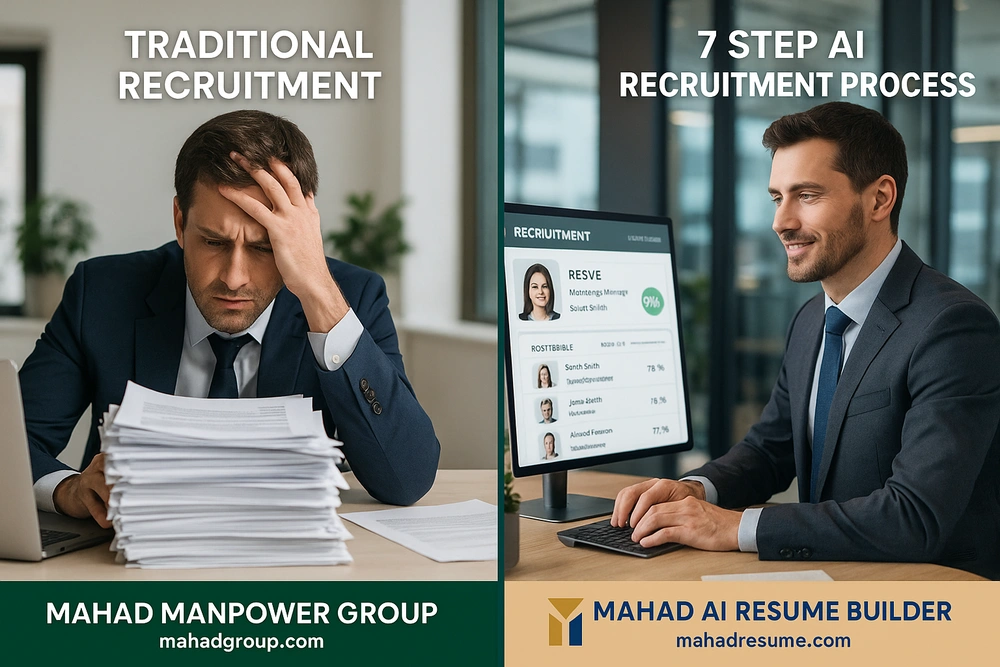 Step 4: AI-Powered Pre-Screening Assessments
Step 4: AI-Powered Pre-Screening Assessments
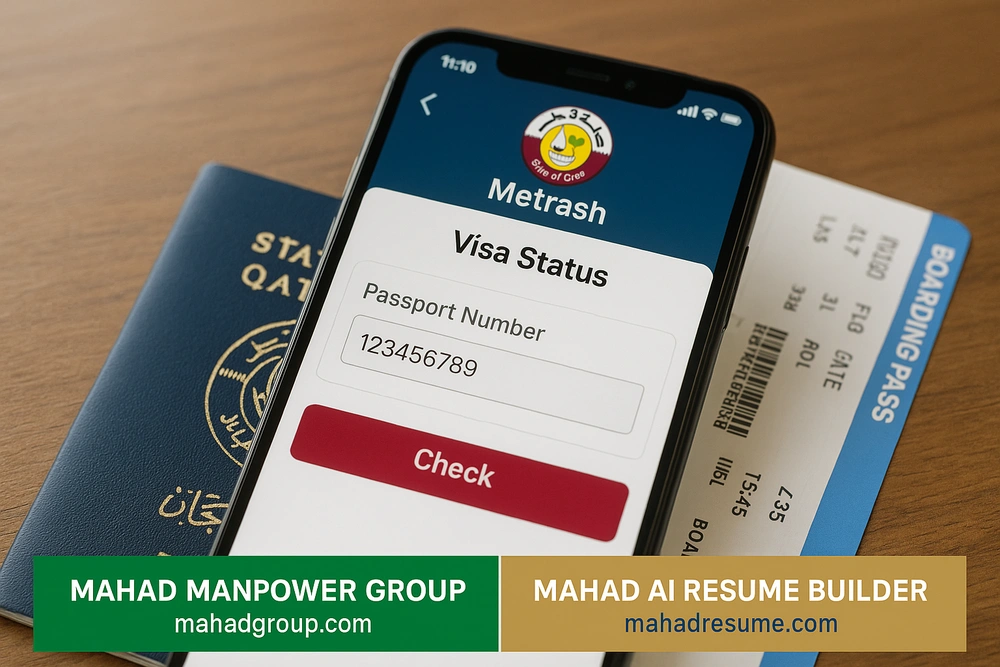 MOI Qatar Visa Check Mobile App
MOI Qatar Visa Check Mobile App

